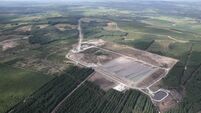Growth in US service sector slows down

The Institute for Supply Management’s non-manufacturing index fell to 56.2 from a November reading of 59.3 that was the second-strongest since 2005, the group’s report showed yesterday. The average for all of 2014 was the highest in nine years.
Gains in consumer spending will probably underpin the service industries that make up almost 90% of the economy as global markets struggle to gain momentum. Increased hiring and the cheapest petrol since 2009 are helping spur sales from car dealers to clothing retailers.
















